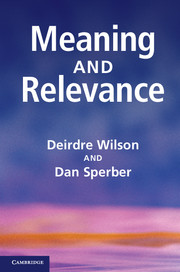Book contents
- Frontmatter
- Contents
- Figures
- Tables
- Preface
- Acknowledgements
- 1 Introduction
- Part I Relevance and Meaning
- 2 The mapping between the mental and the public lexicon
- 3 Truthfulness and relevance
- 4 Rhetoric and relevance
- 5 A deflationary account of metaphors
- 6 Explaining irony
- Part II Explicit and Implicit Communication
- Part III Cross-Disciplinary Themes
- Notes
- References
- Index
5 - A deflationary account of metaphors
Published online by Cambridge University Press: 05 June 2012
- Frontmatter
- Contents
- Figures
- Tables
- Preface
- Acknowledgements
- 1 Introduction
- Part I Relevance and Meaning
- 2 The mapping between the mental and the public lexicon
- 3 Truthfulness and relevance
- 4 Rhetoric and relevance
- 5 A deflationary account of metaphors
- 6 Explaining irony
- Part II Explicit and Implicit Communication
- Part III Cross-Disciplinary Themes
- Notes
- References
- Index
Summary
Introduction
Are metaphors departures from a norm of literalness? According to classical rhetoric and most later theories, including Gricean pragmatics, they are. No, metaphors are wholly normal, say the Romantic critics of classical rhetoric and a variety of modern scholars ranging from hard-nosed cognitive scientists to postmodern critical theorists. On the metaphor-as-normal side, there is a broad contrast between those, like the cognitive linguists Lakoff, Talmy or Fauconnier, who see metaphor as pervasive in language because it is constitutive of human thought, and those, like the psycholinguists Glucksberg or Kintsch, or relevance theorists, who describe metaphor as emerging in the process of verbal communication. While metaphor cannot be both wholly normal and a departure from normal language use, there might be distinct, though related, metaphorical phenomena at the level of thought, on the one hand, and verbal communication, on the other. This possibility is being explored (for instance) in the work of Raymond Gibbs. In this chapter, we focus on the relevance-theoretic approach to linguistic metaphors.
Relevance theory’s approach to metaphor is deflationary. Most rhetorical, literary and philosophical traditions emphasise both the importance and the distinctiveness of metaphor. We acknowledge its importance but dispute its distinctiveness. Metaphors are indeed ubiquitous in language use and contribute to what Barthes called ‘le plaisir du texte’. Specific uses of metaphors by individual authors or in given literary genres are certainly worthy of study, and so is the very idea of metaphor as a culturally salient notion with a long and very rich history. Still, we see metaphors as simply a range of cases at one end of a continuum that includes literal, loose and hyperbolic interpretations. In our view, metaphorical interpretations are arrived at in exactly the same way as these other interpretations. There is no mechanism specific to metaphors, no interesting generalisation that applies only to them. In other terms, linguistic metaphors are not a natural kind, and ‘metaphor’ is not a theoretically important notion in the study of verbal communication. Relevance theory’s account of metaphor is on the lean side, and is bound to disappoint those who feel that verbal metaphor deserves a full-fledged theory of its own, or should be at the centre of a wider theory of language, or even of thought.
- Type
- Chapter
- Information
- Meaning and Relevance , pp. 97 - 122Publisher: Cambridge University PressPrint publication year: 2012
- 11
- Cited by



